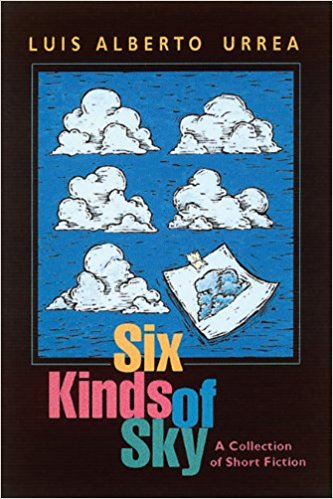Powell’s | IndieBound | Amazon | B&N
 Forward Magazine Book of the Year 2002
Forward Magazine Book of the Year 2002
His protagonists are usually Hispanics and Native Americans whose struggles are documented most touchingly in one of the two longer stories, “A Day in the Life,” which describes the plight of a poverty-stricken group of garbage pickers whose lives are torn apart by tragedy after they are forced to move from Mexico City to Tijuana. Urrea turns his attention to the brokenhearted in “Taped to the Sky,” in which a man who takes to the road after his wife leaves him breaks down in the middle of Wyoming, where he learns the reason for his journey from the Native American man who helps him. He offers a different perspective on the Native American experience in “Bid Farewell to Her Many Horses,” which describes the sorrow of a man who marries a Sioux woman who succumbs to alcoholism, while “Father Returns From the Mountain” is a touching story of a man’s attempt to come to terms with his father’s death in an auto accident. Urrea is a poetic writer who draws strong characters and wears his literary compassion on his sleeve, and he uses all of his gifts to full advantage here.
Reviews
“I always thought Luis Urrea was six skies rolled into one (I mean that in a good way), and this book proves that he speaks with a multitude of passionate, powerful and hilarious voices. This book is a beautiful kind of crazy.”—Sherman Alexie
“With this new collection of stories, Luis Urrea makes the short list of essential American writers. His glittering landscapes, which warp and ennoble the human spirit, bring to mind the work of Salman Rushdie. I found myself going back and rereading whole passages; Urrea’s got a way with words that raises the bar for the rest of us. What a marvel of a book!”—Demetria Martínez
“Urrea goes in for the big picture, and there seems to be no world he cannot capture. He writes with wit and ingenuity, and the stories possess a powerful sense of acceleration. With each story I was transported to an intense and fully imagined world.”—Robert Boswell
From Luis
About Six Kinds of Sky
Short stories. This little book was very important to me, because it felt like a summation of a long long season in my life. I started out with stories and poems, and grew into novels and long non-fiction pieces. It seems sad that a lifetime of scribbling and publishing shorter tales would only give me a book of six worthwhile entries. But there are others out there from this era. Maybe I’ll do something with them…maybe not! Anyway, these are all stories from the time before I started winning awards for stories (like getting the Edgar in 2010— I’m still not sure how that happened).
Six kinds of sky because there are six kinds of life/God/faith/fate in the gathered pieces. My amigo Bobby Byrd, gathered these pieces with me for Cinco Puntos. And he combated my reluctance and made me write the long essay about the stories and about writing for the back of the book. This being an expression of his belief that books should also be useful as teaching texts—that writing students should have some training and insight attached for their own development. That was good because I am very happy with that piece. They do things right in El Paso.
The first story in the book, “Mr. Mendoza’s Paintbrush,” is the oldest story in the book. It went on to become the text for Chrsitopher Cardinale’s stunning graphic novel, Mr. Mendoza’s Paintbrush. Trivia buffs might enjoy knowing that the town in the story, Rosario, Sinaloa, is the real-life basis for the fictional town of Tres Camarones in my later novel, Into the Beautiful North. (A highly fictionalized version of the town also appears in a long story in the collection, “First Light”).
“Bid Farewell to Her Many Horses” has had a good life. You might have heard it on NPR’s “Selected Shorts.” It has appeared there in two different performances. Now it looks like it might become a movie. I wrote it and “Taped to the Sky” in honor of my dear friends who live on the Oglala Lakota reservation of Pine Ridge.
“Father Returns from the Mountain” is the piece that Ursula K. Le Guin discovered when I was a boy grieving a slaughtered father. She published it and launched my life as a writer.